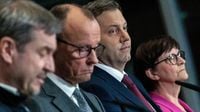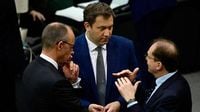The coalition negotiations between Germany's Union and the Social Democrats (SPD) are entering a crucial phase as discussions intensify over key contentious issues. On March 28, 2025, a group of 19 negotiators, led by party leaders Friedrich Merz (CDU), Markus Söder (CSU), Lars Klingbeil, and Saskia Esken (both SPD), convened to tackle the most pressing topics. The aim is to finalize the negotiations by Easter, allowing for a new cabinet to be sworn in by early May in the Bundestag.
Despite the urgency, significant points remain unresolved, particularly in the areas of tax policy, migration, military service, and environmental regulations. The SPD is advocating for an increase in the top income tax rate from 42% to 47% and is pushing for the reintroduction of a wealth tax, which the Union vehemently opposes. Additionally, the SPD wants to enhance tax burdens on capital income and reassess inheritance tax exemptions for business heirs.
On the migration front, both parties have agreed to tighten asylum policies, although specifics are still contentious. A formula compromise allows for the rejection of asylum seekers at the borders, contingent on coordination with European neighbors. However, the degree of involvement required from these neighboring countries remains a point of contention.
The SPD aims to maintain the current pension level of 48%, which may require higher contribution rates, while the Union proposes extending the required contribution years from 45 to 47 to sustain this level. Another sticking point is the proposed expansion of the "mother's pension," with the SPD insisting that the associated costs be covered by tax revenues rather than contributions.
In terms of environmental policy, the Union is calling for the reversal of the EU's planned ban on combustion engines by 2035, while the SPD remains committed to allowing only zero-emission vehicles from that date. The SPD also wants to impose a general speed limit of 130 km/h on highways, a proposal that the Union categorically rejects.
Furthermore, the Union is advocating for the reinstatement of compulsory military service, which was suspended in 2011, citing personnel shortages in the Bundeswehr. Conversely, the SPD insists on maintaining a voluntary service model and seeks a broader societal discussion about military service reforms.
On financial issues, the SPD is pushing for the federal government to assume half of the debts of heavily indebted municipalities, a proposal that faces resistance from the CSU, which is more favorable to a reform of the state financial equalization system.
As negotiations progress, both parties are under pressure to reach a consensus that addresses these diverse and complex issues. The outcome of these talks will not only shape Germany's immediate political landscape but also set the tone for future governance.








